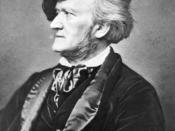The Age of the Enlightenment concentrated on mathematics and reason, which pushed for rationality and the investigation of the universe. However Romantic study involved a greater emotion and British and German writers expressed this attitude. Romanticism is a term that is loosely applied to literary and artistic movements of the late 18th and 19th centuries. Romanticism, in general, is the attitude or state of mind that focuses on the individual, the subjective, the irrational, the creative, and the emotional. Romanticism was a result of the libertarian and egalitarian ideals of the French Revolutions. The basic aims of Romanticism were various: a return to nature and to belief in the goodness of humanity; the rediscovery of the artist as a supremely individual creator; the development of nationalistic pride; and the exaltation of the senses and emotions over reason and intellect. Romanticism was a philosophical revolt against rationalism.
It began in Germany and England in the 1770s, and by the 1820s it swept through Europe, conquering even its most stubborn foe, the French.
It traveled quickly to the Western Hemisphere, and has triumphed in its musical form around the globe, from London to Boston to Mexico City to Tokyo to Vladivostok to Oslo; the most popular orchestral music in the world is that of the romantic era. Friedrich Schlegel first used the term romantic to designate a school of literature opposed to classicism, and he applied the philosophical ideas of Immanuel Kant and J. G. Fichte to the "romantic ideal." Major German writers associated with romanticism include G. E. Lessing, J. G. Herder, Friedrich Holderlin, Schiller, and particularly Goethe, who had a mystic feeling for nature and for Germany's medieval past.
When John Williams created the sound of the future in Star Wars, it was the sound of 19th-century Romanticism--still the most...


